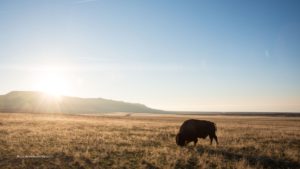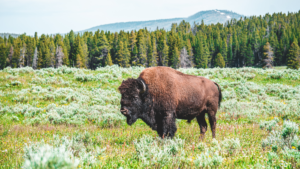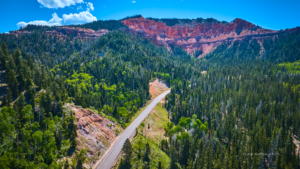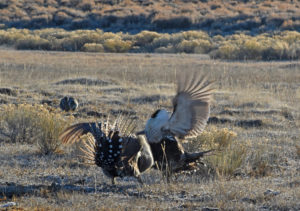FOR IMMEDIATE RELEASE
May 20, 2021
Contact:
- Gary Macfarlane, Ecosystem Defense Director, Friends of the Clearwater, 208-882-9755
- Dr. David Mattson, Grizzly Bear Researcher, 406-210-1578
- Elliot Moffett, President, Nimiipuu Protecting the Environment, 208- 935-8879
- Louisa Willcox, Co-Founder – Grizzly Times, 406-224-2250
- Adam Rissien, Rewilding Advocate, Wild Earth Guardians, 406-370-3147
- Erik Molvar, Executive Director, Western Watersheds Project, 307-399-7910
Lander (WY) – In letters sent today to federal lawmakers and the Biden administration, numerous conservation organizations are calling for urgent executive and legislative action to bolster grizzly bear recovery, even as western lawmakers and officials seek to remove Endangered Species Act (ESA) protections for the threatened species.
According to a new report by Dr. David Mattson, removal of ESA protections would undermine grizzly bear recovery, demonstrating the need to increase current populations and detailing Idaho’s importance for the long-term viability of the species.
“The science suggests that we need from 2,500-9,000 individual grizzlies in the contiguous United States. Central Idaho not only provides a significant amount of excellent grizzly bear habitat, but the region serves as a connective corridor for genetic exchange between grizzly population strongholds in current recovery areas,” said Dr. Mattson.
Conservation organizations—recognizing the urgency to bolster grizzly-bear protections across the West—sent letters to the U.S. Departments of Transportation, Agriculture, and Interior, as well as Congress, calling for coordinated federal action in a broad vision that will ensure the long-term survival of the iconic species. Among several requests, the organizations call for keeping grizzly bears on the endangered species list and ensuring they have safe passage as they return once more to the Bitterroot Mountains in search of food, dens, and mates. Without immediate action, the groups contend that existing—and recently enacted—anti-wildlife policies in Idaho, Montana, and Wyoming will result in more grizzly bear deaths.
“The Grizzly bear—like salmon and wolves—are integral to the life ways of the Nimiipuu, the Nez Perce tribal name for ourselves, which means, The People,” explained Elliot Moffett, President of Nimiipuu Protecting the Environment. “We support the recovery of the grizzly bear and oppose state measures to open up or expand trophy hunting of bears, wolves, and other animal brothers and sisters. The wholesale hunting and trapping of at-risk species is out of balance with responsible management. This is unacceptable.”
In their letter to Interior Secretary Deb Haaland, the groups urge that she resist demands to remove grizzly bears from the list of endangered species and support non-lethal measures to support community efforts to live in peaceful co-existence with the bears.
“With their paws, grizzly bears are showing us that the wildlands of the Selway Bitterroot can again become home. Bears’ recolonization of this landscape is an inspiring new development with broad implications, for this is the ecological lynchpin for grizzly recovery throughout the Northern Rockies,” explained Louisa Willcox. “We need more bears in more places to ensure that they will flourish in the face of climate change and increasing human pressures – and the Selway Bitterroot provides some of the best bear habitat anywhere.”
The organizations also call on Agricultural Secretary Tom Vilsack to take a close look at the Forest Service, which manages a majority of grizzly bear habitat and has been weakening—or omitting altogether—measures to protect habitat bears need to recover and thrive.
“Under the last administration, the Forest Service pushed through land management plans that fail to protect core grizzly bear habitat and lack any safeguards for corridors that bears need to reach new areas,” said Adam Rissien of Wild Earth Guardians. “Instead, the Forest Service prioritized inflated logging objectives and road building that undermines grizzly bear survival.”
In their letter to Transportation Secretary Pete Buttigieg, the organizations ask him to make wildlife crossings throughout the West a priority for funding, either through existing sources or through requests to Congress for dedicated funds.
“Wildlife crossings over and under highways and interstates connect habitat and provide a practical measure to secure grizzly migration,” said Kristin Combs of Wyoming Wildlife Advocates.. “Our letter to Secretary Buttigieg asks that the Department of Transportation immediately prioritize building secure wildlife crossings, a proven solution that benefits any migrating animal and helps avoid human-animal collisions on transportation corridors. Wildlife crossings are smart infrastructure investments, which can save lives.”
The organizations also call for improving management tools to reduce grizzly bear conflicts with livestock operations by increasing funding for non-lethal measures and allowing ranchers to voluntarily retire their grazing permits.
“One of the major causes of grizzly bear deaths is conflict with private livestock on public lands,” said Jocelyn Leroux of Western Watersheds Project. “Reducing grizzly-livestock conflict through win-win voluntary livestock permit retirement can ensure that grizzlies can re-occupy key linkage areas to finally establish in core habitat in the Selway-Bitterroot ecosystem.”
The groups explain that their measures fit within President Biden’s executive action to protect 30% of all U.S. lands and oceans by 2030, which not only would help curb the climate crisis, but also the resulting loss of biodiversity and wildlife habitat.
“Threatened large mammals need more secure habitat,” explained Aaron Peterson with the Yaak Valley Forest Council. “Securing grizzly bear habitat not only protects other wildlife species, but also safeguards forests and the large carbon-sequestering trees that we cannot afford to lose as we tackle the climate crisis.”
Recognizing that grizzly bears need more protection than what federal agencies may provide, and that such safeguards also conserve large, open landscapes in which so many western communities enjoy and rely upon for economic support, the organizations sent a letter urging lawmakers to act.
“We are calling on Congress to pass a holistic legislative package to secure the grizzly bear’s future, one that will protect crucial habitat and provide bears safe passage as they move throughout their original range.” said Gary Macfarlane of Friends of the Clearwater. “In the past, lawmakers introduced a number of favorable bills that would help grizzly bears, and we also remind Congress that it has the power to protect grizzly habitat by designating forest lands as Wilderness, which brings stronger protections under the 1964 Wilderness Act. Finally, Congress can set the tone for grizzly recovery by prioritizing and funding coexistence measures. By combining executive action and legislative action, we can rise to the challenge of securing a future for the grizzly bear. With increasing threats, the time to act is now.”
###






